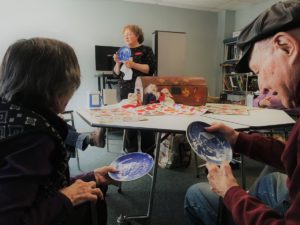
When Steve Staines walked into Cooperative Elder Services, Inc.’s (CESI) Concord Center, a buzz filled the room. The seniors and adults living with medical or cognitive challenges had enjoyed a relaxing start to their morning with coffee and conversation, and were ready to be on the move: excited to sing, dance, and play instruments with one of their favorite regular performers. A musical start to another lively day of group activities.
Therapeutic activities play a critical role in supporting the whole health of seniors; music therapy programs like the one offered at CESI’s adult day health programs support memory recall, promote positive changes in moods, reduce depression, and facilitate communication. These specific health outcomes are particularly advantageous for people living with memory impairment.
“There are so many benefits to seniors participating in therapeutic activities,” said Occupational Therapist Valerie Graf, OTR/L. “These purposeful activities can maintain and increase cognitive and physical abilities, reduce depression and anxiety, preserve independence, and increase an overall sense of purpose and well-being.”
There are endless options for activities that can be modified and optimized to promote cognitive and emotional health: animal therapy decreases heart rate and blood pressure; using adaptive technology (systems that can be easily customized to meet individual needs) has been shown to mitigate the behavioral and psychotic symptoms associated with Alzheimer’s disease; and gardening strengthens fine motor skills. With strategic modifications, many of the activities that brought joy and fulfillment earlier in life can be adapted to accommodate for current limitations. For example, at CESI’s adult day health programs, participants garden in raised beds with ergonomic tools.
Engagement in therapeutic activities often also creates opportunities for socialization and community building, which have a demonstrated effect on improving health outcomes as well. As the following story about a recent program at CESI’s Concord Center demonstrates, by engaging in therapeutic activities with others, curiosity and confidence can be boosted for the entire group:
When Marie visited CESI in March, she brought with her a wide variety of quilts to share with CESI participants: some her own, and some those of her friend, CESI participant Susan. When Susan was diagnosed with early-onset Alzheimer’s disease, many assumed that her beloved activity would need to be a thing of the past. While actively quilting may no longer be a part of Susan’s day-to-day, the appreciation for the craft and the community Susan developed around her remain; she continues to attend her weekly quilting group, where she stays connected with friends and her favorite art form.
The group that gathered to enjoy the quilts Marie brought represented a mix of genders, backgrounds, and interests. One gentleman had spent his life building houses, and was fascinated by the craftsmanship of quilt-making, noting that the process of quilting is not unlike building a home; you need to be able to visualize the finished product, and plan each little detailed step backward before you can begin. Other members of the group who had been unenthusiastic about the idea of quilting were instantly engaged once they realized their friend and fellow participant was co-hosting the group. And for Susan herself, the joy on her face was unparalleled as she held up two corners of her quilts and let them unfurl for everyone to admire.
Take a class at the Community Center, attend the Lexington Memory Café, or gather together old friends to learn something new; whatever therapeutic activity you choose, your health will benefit as a result.


